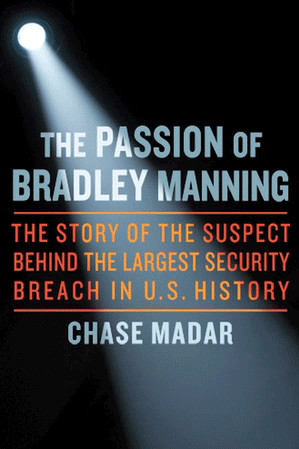Chase Madar: The Passion of Bradley Manning (2012)
Filed under book | Tags: · biography, intelligence agency, law, leaking, military, security, whistleblowing, wikileaks

“In May 2010, an intelligence analyst in the US Army’s 10th Mountain Division was arrested on suspicion of leaking nearly half a million classified government documents, including the infamous “Collateral Murder” gunsight video and 260,000 State Department cables. After nine months in solitary confinement, the suspect now awaits court-martial in Fort Leavenworth. He is twenty-four, comes from Crescent, Oklahoma and his name is Bradley Manning.
Who is Private First Class Bradley Manning? Why did he allegedly commit the largest security breach in American history–and why was it so easy? Is Manning a traitor or a whistleblower? Is long-term isolation an outrage to American values–or the new norm? Are the leaks revolutionary or a sensational nonevent? Which is the greater security threat, routinized elite secrecy or flashes of transparency? And what impact does new information really have?
The astonishing leaks attributed to Bradley Manning are viewed from many angles, from Tunisia to Guantánamo Bay, from Foggy Bottom to Baghdad to small-town Oklahoma. Around the world, the eloquent alleged act of one young man obliges citizens to ask themselves if they have the right to know what their government is doing.”
Publisher OR Books, April 2012
ISBN 1935928538, 9781935928539
190 pages
United States v. Bradley Manning (Wikipedia)
1.5-hour special broadcast on the Bradley Manning verdict (Democracy Now!, 30 July 2013)
Table detailing verdict in Bradley Manning trial (AlexaOBrien.com)
Richard J. Aldrich: GCHQ: The Uncensored Story of Britain’s Most Secret Intelligence Agency (2010)
Filed under book | Tags: · code, cold war, computing, encryption, history, intelligence agency, surveillance, technology, united kingdom

The gripping inside story of the last unknown realm of the British secret service: GCHQ (Government Communication Headquarters).
GCHQ is the successor to the famous Bletchley Park wartime code-breaking organisation and is the largest and most secretive intelligence organisation in the country. During the war, it commanded more staff than MI5 and MI6 combined and has produced a number of intelligence triumphs, as well as some notable failures. Since the end of the Cold War, it has played a pivotal role in shaping Britain’s secret state. Still, we know almost nothing about it.
In this ground-breaking new book, Richard Aldrich traces GCHQ’s evolvement from a wartime code-breaking operation based in the Bedfordshire countryside, staffed by eccentric crossword puzzlers, to one of the world leading espionage organisations. It is packed full of dramatic spy stories that shed fresh light on Britain’s role in the Cold War – from the secret tunnels dug beneath Vienna and Berlin to tap Soviet phone lines, and daring submarine missions to gather intelligence from the Soviet fleet, to the notorious case of Geoffrey Pine, one of the most damaging moles ever recruited by the Soviets inside British intelligence. The book reveals for the first time how GCHQ operators based in Cheltenham affected the outcome of military confrontations in far-flung locations such as Indonesia and Malaya, and exposes the shocking case of three GGHQ workers who were killed in an infamous shootout with terrorists while working undercover in Turkey.
Today’s GCHQ struggles with some of the most difficult issues of our time. A leading force of the state’s security efforts against militant terrorist organisations like Al-Qaeda, they are also involved in fundamental issues that will mould the future of British society. Compelling and revelatory, Aldrich’s book is the crucial missing link in Britain’s intelligence history.
Publisher HarperPress, 2010
ISBN 0007278470, 9780007278473
666 pages
review (Richard Norton-Taylor, The Guardian)
review (Sinclair McKay, The Telegraph)
review (Duncan Campbell, New Statesman)
review (The Economist)
#Intelligence (2012)
Filed under report | Tags: · intelligence agency, privacy, social media, surveillance

The growth of social media poses a dilemma for security and law enforcement agencies. On the one hand, social media could provide a new form of intelligence – SOCMINT – that could contribute decisively to keeping the public safe. On the other, national security is dependent on public understanding and support for the measures being taken to keep us safe.
Social media challenges current conceptions about privacy, consent and personal data, and new forms of technology allow for more invisible and widespread intrusive surveillance than ever before. Furthermore, analysis of social media for intelligence purposes does not fit easily into the policy and legal frameworks that guarantee that such activity is proportionate, necessary and accountable.
This paper is the first effort to examine the ethical, legal and operational challenges involved in using social media for intelligence and insight purposes. It argues that social media should become a permanent part of the intelligence framework but that it must be based on a publicly argued, legal footing, with clarity and transparency over use, storage, purpose, regulation and accountability. #Intelligence lays out six ethical principles that can help government agencies approach these challenges and argues for major changes to the current regulatory and legal framework in the long-term, including a review of the current Regulation of Investigatory Powers Act 2000.
Authors Sir David Omand, Jamie Bartlett, Carl Miller
Publisher Demos, London, 24 April 2012
ISBN 978-1-909037-08-3
Creative Commons license
106 pages

